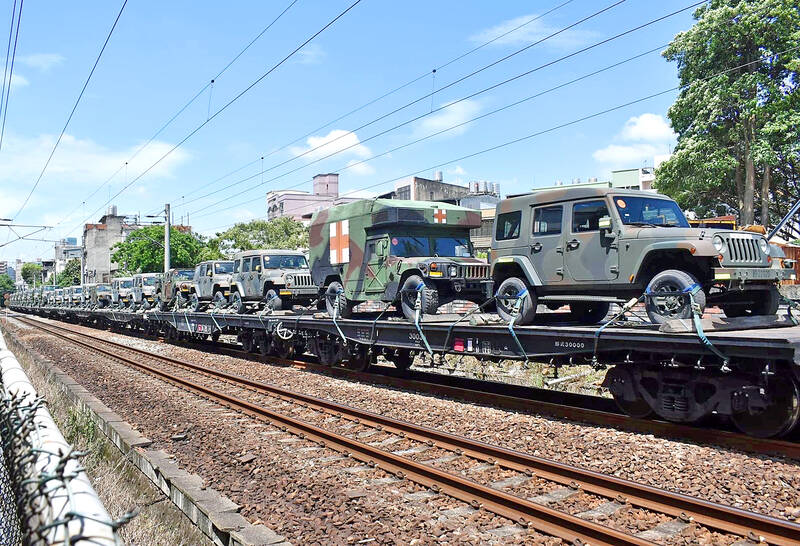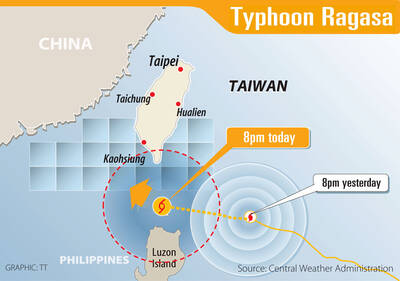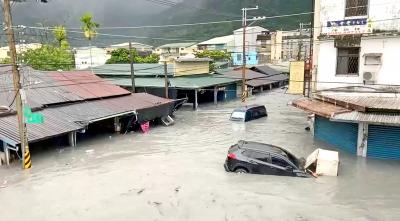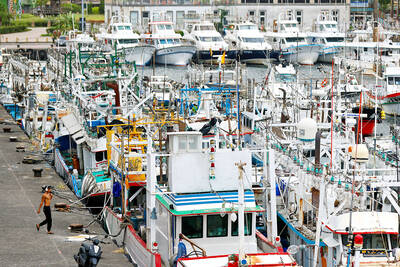Two new diesel-powered locomotives procured by Taiwan Railway Corp (TRC) are powerful enough to transport the military’s M142 High Mobility Artillery Rocket System (HIMARS) or 105mm artillery system, the state-run railway company said yesterday.
The nation’s largest railway operator highlighted its capability to transport military equipment following a recent meeting between TRC chairman Tu Wei (杜微) and All-Out Defense Mobilization Agency Transport Department Director Lee Shih-jie (李世傑).
Tu and Lee exchanged views on some technical issues, including expanding cargo-loading training and installing conveying equipment, bridge decks, improved caboose and new mobile terminal platforms.

Photo courtesy of Taiwan Railway Corp
The two agencies have set a preliminary schedule on the coordination and special task force meetings, TRC said.
“We have been trying to improve our transportation models and make the best plans by coordinating with the military and cargo dealers. TRC employees are to apply skills they learn from the training when transporting goods and military equipment,” Tu said.
“We have also prepared to meet the needs for transportation when the natural disasters hit,” he said.
The railway company has purchased two diesel-powered R200 locomotives, with testing to be completed this month, Tu added.
The two locomotives are scheduled to be in operation next month, he said.
“With their high horsepower, the locomotives would be able to increase the tonnage of cargo trains and reduce transportation time. The military palns to introduce M142 HIMARS or 105mm artillery systems, both of which are wheeled vehicles that can be transported by using TRC’s flat cars,” Tu said.
Separately, the railway police are searching for a passenger who on Friday deliberately pulled the conductor’s valve on the ninth car of a EMU3000 train causing it to automatically stop at Taitung’s Jinlun (金崙) Station.
To reduce the amount of delay, the railway boarded passengers to another train that arrived 26 minutes later, the TRC said, adding that the train was not damaged.
The train resumed operation after the valve was returned to its normal position, it said.
“We have reviewed the surveillance footage recorded at the ninth cabin and turned the evidence over to the Railway Police Bureau,” the company said.
TRC vice chairman Liu Shuang-huo (劉雙火) said the valve should be used in emergencies in which the conductor needs to stop the train immediately.
Pulling down the valve without any legitimate reason would cause the train to stop abruptly and passengers could be injured, he said.
There is a sign next to the valve warning people to not touch the device, he said.
Once caught, the passenger would not only be fined but face criminal punishment for endangering public safety, Liu added.

WARNING: People in coastal areas need to beware of heavy swells and strong winds, and those in mountainous areas should brace for heavy rain, the CWA said The Central Weather Administration (CWA) yesterday issued sea and land warnings for Typhoon Ragasa, forecasting that it would continue to intensify and affect the nation the most today and tomorrow. People in Hualien and Taitung counties, and mountainous areas in Yilan and Pingtung counties, should brace for damage caused by extremely heavy rain brought by the typhoon’s outer rim, as it was upgraded to a super typhoon yesterday morning, the CWA said. As of 5:30pm yesterday, the storm’s center was about 630km southeast of Oluanpi (鵝鑾鼻), Taiwan’s southernmost tip, moving northwest at 21kph, and its maximum wind speed had reached

MATAIAN RIVER: Rescue operations were ongoing, with officials urging residents to move to higher floors where possible as teams focus first on those at ground level Floodwaters from the overflowing Mataian River (馬太鞍溪) barrier lake swept into Hualien County’s Guangfu Township (光復) yesterday afternoon, leaving hundreds of people trapped and three missing as of press time last night, the Hualien County Fire Bureau said. The waters surged into downtown Guangfu after the riverbank burst at about 2:50pm, carrying mud and debris and submerging streets to rooftop level in some areas. Residents were seen climbing onto vehicles and rooftops to await rescue as thick, silt-laden water inundated the town. The surge destroyed the Mataian Bridge (馬太鞍溪橋) and flooded the Guangfu Railway Station. Rescue operations were launched with support from fire departments

The Central Weather Administration (CWA) yesterday said that it expected to issue a sea warning for Typhoon Ragasa this morning and a land warning at night as it approached Taiwan. Ragasa intensified from a tropical storm into a typhoon at 8am yesterday, the CWA said, adding that at 2pm, it was about 1,110km east-southeast of Oluanpi (鵝鑾鼻), Taiwan’s southernmost tip. The typhoon was moving northwest at 13kph, with sustained winds of up to 119kph and gusts reaching 155kph, the CWA Web site showed. Forecaster Liu Pei-teng (劉沛滕) said that Ragasa was projected to strengthen as it neared the Bashi Channel, with its 200km

PUBLIC ANNOUNCEMENTS: Hualien and Taitung counties declared today a typhoon day, while schools and offices in parts of Kaohsiung and Pingtung counties are also to close Typhoon Ragasa was forecast to hit its peak strength and come closest to Taiwan from yesterday afternoon through today, the Central Weather Administration (CWA) said. Taiwan proper could be out of the typhoon’s radius by midday and the sea warning might be lifted tonight, it added. CWA senior weather specialist Wu Wan-hua (伍婉華) said that Ragasa’s radius had reached the Hengchun Peninsula by 11am yesterday and was expected to hit Taitung County and Kaohsiung by yesterday evening. Ragasa was forecast to move to Taiwan’s southern offshore areas last night and to its southwestern offshore areas early today, she added. As of 8pm last night,